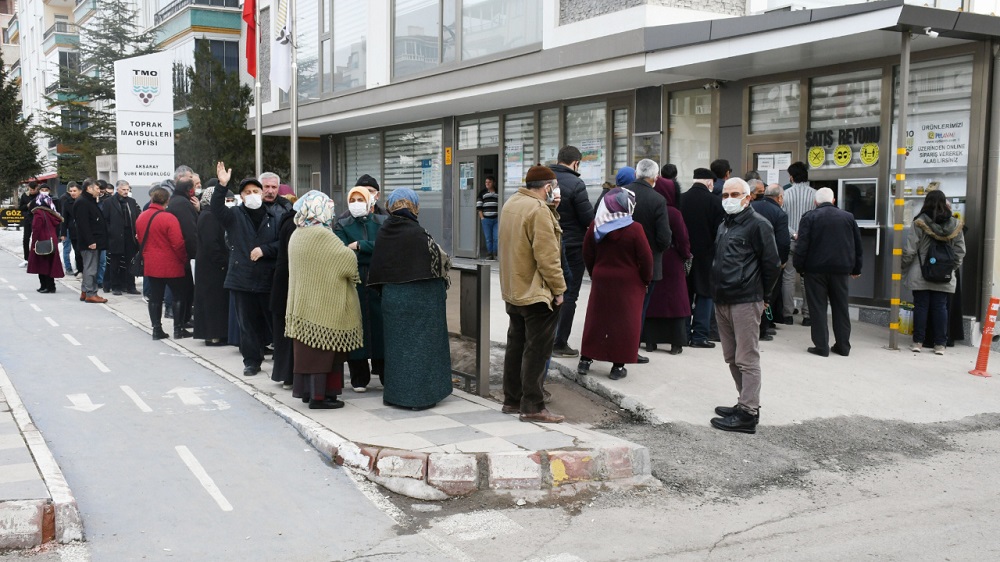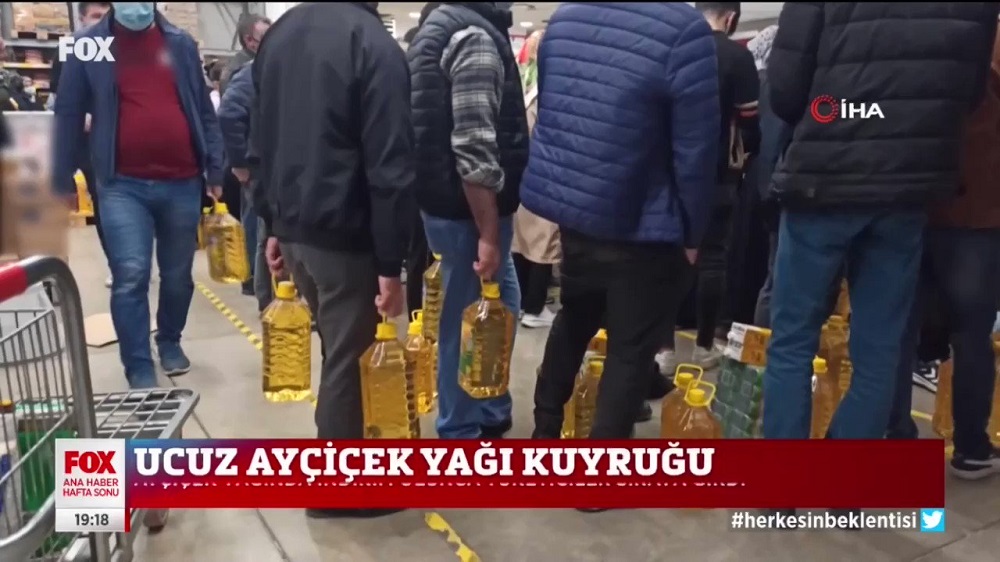Turkey runs out of sunflower oil as Russia-Ukraine war disrupts imports
Sunflower oil deficiency in Turkey
The already long list of economic problems facing Turkey has expanded. One of the unexpected and relatively quick results of the war in Ukraine for the citizens of this country was the disappearance of sunflower oil from store shelves. It cannot be found in stores, and the sale of it is limited.
JAMnews tried to find out what caused the sunflower oil deficiency in Turkey.
- Turkey anticipates opening of borders with Armenia
- What caused the collapse of Turkish lira – political or economic reasons?
- Erdogan’s government about to face a trial by lira
Economic crisis continues
Turkey, which has been going through an economic crisis for a long time, faced another serious problem after the start of the Russian occupation war in Ukraine.
Since 2018, the national currency of Turkey, lira, has been constantly losing value against the US dollar. In just over three years, the US dollar rose from 3 to 15 Turkish liras.
According to official statistics, annual inflation in Turkey at the beginning of March 2022 has amounted to 54%. At the same time, independent financial institutions claim that annual inflation is currently at the level of 123%.
Western sanctions against Russia due to the war of occupation in Ukraine have put the Turkish economy in an even more difficult position.

Most of the orders from Ukraine and Russia for travel packages in different cities of Turkey have already been cancelled. Tourists from these two countries make up over 19% of the total tourist flow to Turkey.
Also, the flow of tourists was negatively affected by the ban on flights of Russian airlines. Due to insurance risks, Turkish airlines have also stopped flying to Russia.
After US sanctions on the Russian oil and gas sector, energy prices jumped sharply on world markets. Turkey, as an importer of oil and gas, is also suffering losses.
As Turkish energy expert Necdet Pamir said in an interview with Deutsche Welle, Turkey spent $28.8 billion on energy imports in 2020. In 2021, this figure increased to $51 billion. Given the current prices on world markets, growth will continue in 2022. “Unless there is a sharp drop in energy prices, Turkey’s budget spending on oil and gas imports will exceed $70 billion. The budget simply cannot endure such a load”, Pamir said.
Sunflower oil deficiency
In addition to all these difficulties, the people of Turkey recently faced another completely unexpected problem. Sunflower oil has disappeared from store shelves across the country. Despite the fact that the prices of this product have skyrocketed, people are lining up in long lines for vegetable oil.
Most supermarkets have introduced limits on the sale of sunflower oil – no more than two bottles per person. Sellers explain this by the lack of goods in warehouses, as well as the rush demand of the population. Many people buy sunflower oil in reserve.
According to Turkish Minister of Agriculture Vahid Kirishchi, the situation with sunflower oil is connected with the suspension of imports of this product from Ukraine and Russia. “Turkey is currently looking for new markets for oil supplies”, he said. The minister also added that there is no reason to panic: “The country’s stocks of sunflower oil will last us several months”.
Turkish President Recep Tayyip Erdogan also commented on the growing demand for sunflower oil.
“There is no crisis of sunflower oil”, he said, adding that the rumors about the oil shortage were spread by members of the political opposition. The head of state also threatened those entrepreneurs who keep goods in warehouses and create artificial demand.
“Anyone who knows the facts of hiding sunflower oil in warehouses, please report this to the police”, Erdogan added.
Causes of the oil crisis
Why is such an agrarian country like Turkey unable to provide itself with the proper amount of sunflower oil?
The rise in oil prices in Turkey is connected not only with the war in Ukraine. Last year, the cost of a liter of sunflower oil in Turkey rose to 30 lira [about $3 in 2021 exchange rates], causing a big stir in the country. Now the price of 1 liter of sunflower oil has exceeded 40 lira [about $2.8 at the current exchange rate].

According to statistics from the Turkish Ministry of Agriculture, in 2021, the country ranked first in the world in terms of imports of sunflower oil. Thus, 1.1 billion US dollars was spent on the supply of these products to Turkey.
65% of imports come from Russia, 4 percent – from Ukraine.
According to the head of the Turkish Association of Oil Producers, Tahir Buyukhalvacigil, the volume of sunflower oil consumption in Turkey exceeds production by 1 million tons, or 60% per year. He sees state support for producers as the only way out of the situation.
According to the leader of one of the Turkish agricultural syndicates, Baki Ramzi Suichmez, if instead of short-term support programs the state takes up long-term programs, Turkey can fully cover its own demand for sunflower oil in the future. He noted that the same problems can be seen in the supply of wheat and corn.
According to Suichmez, zeroing import taxes on sunflower oil during the harvest period is confusing for farmers. If taxes on imports are high and local production is subsidized, then in a few years the dependence on imports will be zero, he argues.
On March 9, 2022, the Turkish Ministry of Agriculture decided to ban the export of sunflower oil, and also zeroed import taxes on this product until July this year.
In addition to this, Turkish ships loaded with sunflower oil set out from Russian ports.
What is the situation like in Europe?
JAMnews asked Azerbaijanis living in different European countries about the situation with sunflower oil sales there.
“I went to the supermarket today to buy some, the shelves were completely empty. There is no sunflower oil. This is not a problem for me, I bought rapeseed”, Chingiz Sultansoy, who lives in Germany said.
“The problem is felt only in stores selling products from Russia. The rest here is a discount on a discount. But food prices are rising, of course”, said Yegana Narimanova from the Netherlands.
“Everything is still there, but everything becomes more expensive every day. Minced meat, which until recently cost 7€ for 650 gr., I bought yesterday for 7.45”, said Aliya Ismailzade, who lives in France.
“Everything is fine in the Czech Republic, but prices have gone up dramatically”, said Matanat Azizova from Prague.


















